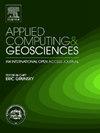在鲁棒和预优化有限元模拟器中利用耦合水力热力学分析进行井眼完整性评估
IF 3.2
Q2 COMPUTER SCIENCE, INTERDISCIPLINARY APPLICATIONS
引用次数: 0
摘要
深入了解井筒周围的应力分布对于保持井筒稳定性至关重要,特别是在具有复杂轨迹和地表地层耦合力学行为的深井中。该研究介绍了一种新的基于有限元的模块化模拟器,旨在解决各种具有挑战性的钻井和边界条件,包括存在或不存在滤饼、高压、非均质和各向异性地层、非线性本构行为和斜井。该模拟器使用有限元建模来提供准确的应力预测,而不是现有商业工具中常见的过于保守的假设。每个模块都针对发布的分析解决方案进行了预先测试和验证,并具有用户友好的界面,输入要求最小,允许在2D和3D配置中进行快速和强大的模拟。该模拟器可以分析各种现象,包括随时间变化的孔隙压力扩散、温度引起的应力变化,以及非均质地层和分层对应力集中的影响。所有预测试模块在中档工作站上以60秒的速度运行,同时将分析溶液匹配在0.2%以内。我们提供了几个案例研究,展示了模拟器相对于现有商业工具的优势,所有模块都是公开可用的,以促进更广泛的应用。本文章由计算机程序翻译,如有差异,请以英文原文为准。
Borehole integrity evaluation utilizing coupled hydraulic thermal and mechanical analyses in robust and pre-optimized finite element simulator
A thorough understanding of stress distribution around wellbores is crucial for maintaining wellbore stability, especially in deep wells with complex trajectories and subsurface formations exhibiting coupled mechanical behaviors. This study introduces a new finite-element-based modular simulator designed to address a wide range of challenging drilling and boundary conditions, including the presence or absence of filter cake, high over-pressure, inhomogeneous and anisotropic formations, non-linear constitutive behavior, and deviated wells. The simulator uses finite element modeling to provide accurate stress predictions without the overly conservative assumptions common in existing commercial tools. Each module is pre-tested and validated against published analytical solutions and features a user-friendly interface with minimal input requirements, allowing for quick and robust simulations in both 2D and 3D configurations. The simulator can analyze various phenomena, including time-dependent pore pressure diffusion, temperature-induced stress variations, and the impact of heterogeneous formations and layering on stress concentrations. All pre-tested modules run in <60 s on a mid-range workstation while matching analytical solutions to within 0.2 %. We present several case studies that demonstrate the simulator's advantages over existing commercial tools, with all modules made openly available to facilitate broader application.
求助全文
通过发布文献求助,成功后即可免费获取论文全文。
去求助
来源期刊

Applied Computing and Geosciences
Computer Science-General Computer Science
CiteScore
5.50
自引率
0.00%
发文量
23
审稿时长
5 weeks
 求助内容:
求助内容: 应助结果提醒方式:
应助结果提醒方式:


